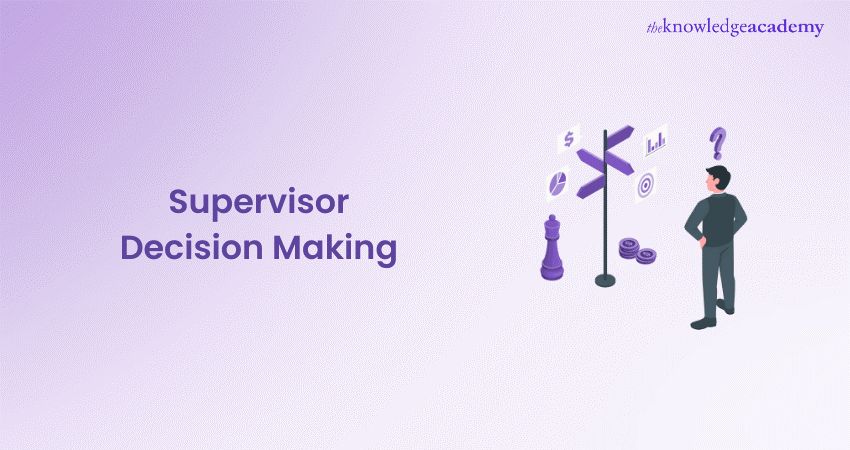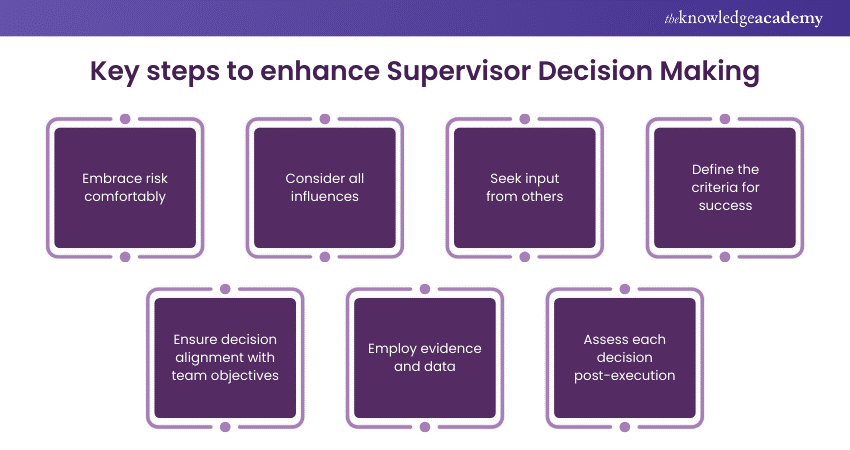We may not have the course you’re looking for. If you enquire or give us a call on + 1-866 272 8822 and speak to our training experts, we may still be able to help with your training requirements.
We ensure quality, budget-alignment, and timely delivery by our expert instructors.

A Supervisor has many responsibilities, and one of them is Decision Making. They are expected to take decisions and make the right calls for the team. This means improving Supervisor Decision Making skills is key for a team's success. A good decision is taken after considering many factors. If you are not careful during this process, it will cost you more than what you planned initially. A great business decision has the power to make or break a business.
In this blog, we have discussed how to make better business choices by considering various factors. They include risks, internal and external factors, input from others, the business goals, and analytical data before deciding what action to take next. Keep reading to understand more about Supervisor Decision Making.
Table of Contents
1) Seven Steps to enhance Supervisor Decision Making
a) Embrace risk comfortably
b) Taking internal and external influences into account
c) Seek input from others
d) Define the criteria for success
e) Ensure decision alignment with team objectives
f) Employ evidence and data
g) Assess each decision post-execution
2) Conclusion
Seven steps to enhance Supervisor Decision Making
Every decision from a Supervisor can affect benefits, risks, and even how stakeholders view things. It is a balancing act, considering what is good for now against what is best for the future and holding everyone’s interests in mind. Here are the seven steps to enhance Supervisor Decision Making skills.

1) Embrace risk comfortably
Think about if you are okay with taking big risks or if you prefer to play it safe when making business decisions. If you are not ready to take risks, consider getting insurance or finding other ways to save yourself financially. If you are not sure how to handle risks, it is okay to hold off on big decisions until you feel more confident.
As a Supervisor, every decision you make has its risks. Deciding how work gets done can affect different parts of the team. Choosing who works on projects can determine if they get finished on time. Even deciding which employees collaborate can impact how happy everyone is.
If you want to become better at your Decision Making Process, you need to prepare yourself for taking risks and making mistakes. It is completely fine to admit when you are wrong and learn from it.
2) Taking internal and external influences into account
Internal factors are those factors that exist within the business, and they lie within the organisation's powers. Such things include financial resources and physical resources.
You are not responsible for some of these things as a Supervisor. However, your decisions will impact on the other areas. This is because, when leading your team, you have to consider all the factors, including those influencing you, your team, and the organisation as a whole
3) Seek input from others
There are many people who can help you in making a business decision. It is likely your employees, customers, and suppliers. Additionally, a discussion with the Human Resources department and colleagues should be considered.
You may even call for a brainstorming meeting. This is a meeting at which you call people who can help you make some decisions by sharing ideas. For example, you may call your employees or even brainstorm with other business owners.
You could also hold brainwriting sessions; it is a brainstorming session, and this time, it is not spoken but rather written by the people in the meeting. This ensures that everybody has a voice and that ideas are not influenced by leadership or people of strong personalities.
4) Define the criteria for success
It is pretty hard to celebrate when one does not know what success looks like, particularly in the case of new business when there are no really apparent metrics of success. This can apply, too, if you are a Supervisor who inherited your team from a previous leader. Sometimes, one leader's goals for his employees are not goals that you want to set for your team.
Whatever "success" means to your company, write that down—whatever "it" is so that people are on the same page as far as what, exactly, they're working for while wading through their projects at work every day (and year).
Enhance your leadership skills through our Decision Making Skills Training. Join now!
5) Ensure decision alignment with team objectives
Among the best factors that any person should consider when making a business decision is whether the decision that he will decide to take on will be able to meet the aims of the company. If you know what the aims of the company are, everything else can definitely be based on that.
It’s also vital to reflect how any given decision fits with your mission statement and values. In actual fact, well-to-do describes the fact that the job description of each employee should match their values and those of the larger organisation.
6) Employ evidence and data
However, business decisions need to be supported by data. There is no way a Supervisor will make a flurry of decisions that are set to affect his team based on gut feelings. That doesn't mean, however, that in such situations, one doesn't go with their gut feeling. Solid evidence is what, in these cases, one would want to be able to point at as some kind of reason they made some of the decisions they made.
7) Assess each decision post-execution
Once the decision has been made, it's only proper to reflect upon its outcome. Did things come out as per your hopes, or did everything literally go up in smoke? What have you done right when making those decisions, and what would you have done differently?
In this way, you can actually ask yourself such questions to see if you are an improved decision-maker. Questions of this nature similarly help you find your areas of strengths and weaknesses. For example, you may find that you make better pressure decisions as opposed to decisions made over a period of a week.
You can even make your assessment stronger with feedback from your superiors on how such decisions affected the organisation. This will help put your decisions in perspective and get a big picture that would further help in the development of the next decisions.
Be a great leader through our Leadership Skills Course - Sign up now!
Conclusion
We hope you read and understand Supervisor Decision Making. Decision Making emerges as an important component of any problem-solving exercise. Making the right decision in business can be quite challenging. Hopefully, the above goes a long way in realising well-informed thriving business decisions. Take heed and consider the following; if you come across an opportunity while pursuing your business endeavors, seize it wholeheartedly!
Enhance your organisational efficiency through our Successful People Management and Team Leadership Course. Register today!
Frequently Asked Questions

A Supervisor is a person who watches and guides the work of the team in a way that they meet goals by having a high standard of quality in their work

The basic skills concerning supervision cover ability in leadership, communication, motivation, feedback, conflict resolution, time management, and utilisation of resources.

The Knowledge Academy takes global learning to new heights, offering over 30,000 online courses across 490+ locations in 220 countries. This expansive reach ensures accessibility and convenience for learners worldwide.
Alongside our diverse Online Course Catalogue, encompassing 17 major categories, we go the extra mile by providing a plethora of free educational Online Resources like News updates, Blogs, videos, webinars, and interview questions. Tailoring learning experiences further, professionals can maximise value with customisable Course Bundles of TKA.

The Knowledge Academy’s Knowledge Pass, a prepaid voucher, adds another layer of flexibility, allowing course bookings over a 12-month period. Join us on a journey where education knows no bounds.

The Knowledge Academy offers various Leadership Courses, including Leadership Skills Course, Agile Leadership Training and Instructional Design Training. These courses cater to different skill levels, providing comprehensive insights into Delegation Skills for Effective Leadership.
Our Business Skills Blogs cover a range of topics offering valuable resources, best practices, and industry insights. Whether you are a beginner or looking to advance your skills, The Knowledge Academy's diverse courses and informative blogs have you covered.
Upcoming Business Skills Resources Batches & Dates
Date
 Leadership Skills Training
Leadership Skills Training
Fri 14th Feb 2025
Fri 11th Apr 2025
Fri 13th Jun 2025
Fri 8th Aug 2025
Fri 26th Sep 2025
Fri 21st Nov 2025







 Top Rated Course
Top Rated Course



 If you wish to make any changes to your course, please
If you wish to make any changes to your course, please


